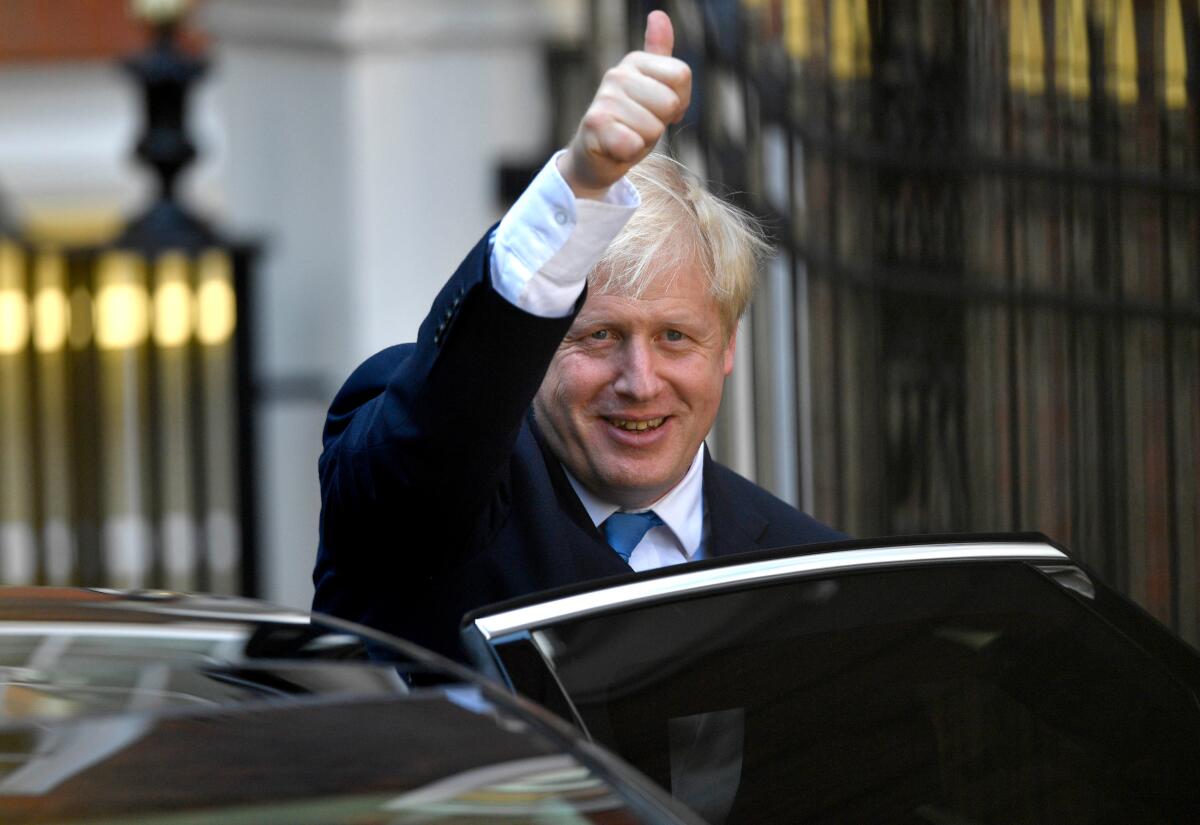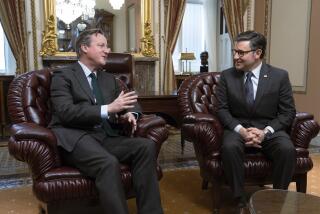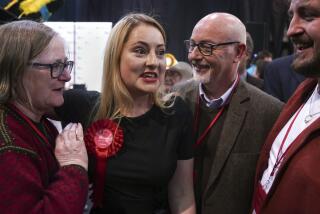Heading into crucial British vote, a patrician prime minister takes up the populist Brexit banner

From his elite education to his posh accent, Alexander Boris de Pfeffel Johnson is, despite his shambling appearance, the very embodiment of a wealthy, powerful and privileged British establishment.
But as the 55-year-old prime minister crisscrosses the country in advance of an enormously consequential election next month, he is casting himself in a role that has served him well throughout his political career: a cheerfully down-to- earth guy, a full-throated man of the people.
In a campaign dominated by Brexit — Britain’s tortuous effort to leave the European Union — Johnson is wielding the populist cudgel in ways that many critics fear could have long-term, damaging effects on the country’s centuries-old democratic traditions. He bashes Parliament, pooh-poohs the authority of the courts and accuses political rivals of seeking to thwart the will of the people, as expressed in the 2016 Brexit referendum.
The prime minister, who assumed his office in July on the strength of a leadership vote by about 160,000 dues-paying members of his Conservative Party, is for the first time the party’s standard-bearer in a general election set for Dec. 12, two years ahead of schedule. Much is at stake: If Johnson can win a parliamentary majority, he vows to swiftly push through a thrice-delayed Brexit, brushing aside fears of economic upheaval and social disruption.
This election is being portrayed in many quarters as a far-reaching referendum on Britain’s status as a pillar of a postwar order that has kept peace in Europe for seven decades and perhaps, ultimately, whether the United Kingdom will remain united.
But on the campaign trail, Johnson hews to a simple, repetitive message: “Get Brexit done!”
Opponents struggling to connect with voters are left to voice more nuanced themes: That leaving the European Union, rather than representing a clean break, will only mark the start of decades of complex and contentious negotiations. That rather than asserting its sovereignty, a post-Brexit Britain will find itself at the mercy of potentially predatory trading partners, perhaps including the United States. That the lifting up of society’s “left-behinds” must involve a recalibration of domestic priorities and won’t be achieved simply by turning Britain’s back on its closest partners.
A scant month before the vote, opinion polls give Johnson’s party a commanding lead. But analysts say traditional party loyalties may break down as voters seek to find a way to express their views on whether to “leave” or “remain.” That was the ballot question on the June 2016 Brexit referendum that resulted in a narrow 52%-48% vote to depart the bloc and has left the country at loggerheads since.
“Brexit identity is more powerful than party identity, and people will try to vote to get the best outcome in line with that,” said Tim Bale, a politics professor at Queen Mary University of London. That scrambles the notion of simple party-line loyalties and introduces the notion of “tactical” voting guided by Brexit, he and others say.
Under Johnson, the Conservative platform centers on getting out of the EU — but the even harder-line, single-issue Brexit Party, created this year to contest European Parliament elections, says Johnson has already ceded too much ground to EU negotiators. It could thus siphon off votes cast by the most die-hard Brexit advocates, who would prefer to see Britain “crash out” of the bloc without a withdrawal accord.
President Trump, in commentary delivered via Twitter and soundbites from the White House, has called on Johnson to strike an electoral pact with Nigel Farage, the far-right politician who is not contesting a seat, but is leading the Brexit Party’s national campaign.
“What I’d like to see is for Nigel and Boris to come together,” Trump told reporters last week.
But although Trump considers both men his ideological allies and calls each his good friend, a public embrace by the two is considered unlikely. Many moderate members of Johnson’s party are put off at least in part by Farage’s longtime association with nationalist-fringe figures who openly espouse racist and anti-Muslim views.
The Labor Party, the main opposition, has sought to tread a centrist path, saying it would negotiate a new Brexit accord and then put it to a popular vote. But it is hampered by the seeming ambiguity of its Brexit stance, and by the personal unpopularity of its leader, Jeremy Corbyn, who is considered by many voters to be too radical and is also dogged by accusations of anti-Semitism.
That leaves the straight-up “remain” stance to voters scattered among smaller opposition parties such as the Liberal Democratic Party and the Scottish National Party, Scotland’s largest. The latter represents a direct challenge to Johnson not only in opposing Brexit, which Scottish voters emphatically rejected, 62% to 38%, but also by seeking to revive an independence referendum if Britain pushes ahead with plans to leave the EU.
The prime minister has said he would try to block any new Scottish breakaway vote, saying Scotland’s failed 2014 independence referendum settled the matter.
Mindful that Johnson benefits from a divided opposition, some of the smaller parties are forming an alliance, looking at dozens of constituencies across England and Wales where candidates would step aside in one another’s favor in a bid to garner more seats for members of Parliament opposing Brexit.
Amid this fragmented landscape — and even before the campaign’s formal start last week— Johnson has alarmed many critics with his willingness to batter democratic norms and institutions, including some important precepts of Britain’s unwritten constitution.
When Parliament voted this year to prevent the prime minister from crashing out of the EU without a departure accord, Johnson angrily branded it a “surrender” bill, saying his hands had been tied because he could no longer seek to win concessions from the bloc by threatening a chaotic split.
When he suspended Parliament, limiting the time for weighing Brexit-related matters in advance of a then-scheduled Halloween departure date, he received a highly unusual smackdown from the Supreme Court, which ruled that he had acted unlawfully in sending lawmakers home — and strongly implied, while not saying so directly, that he had lied to the public, and to Queen Elizabeth II, about his motives. Johnson grudgingly acceded as Parliament was reconvened, but his lieutenants railed bitterly about judicial overreach.
His opening campaign salvos have revolved around accusing his opponents of bad faith and of undermining democracy — a script that may sound familiar to those following the impeachment proceedings unfolding across the Atlantic against Trump.
“We can take back control!” Johnson told cheering followers at his party’s election launch. “This country is aching to move on…. Let’s make 2020 about the people of this country, and not its politicians!” In a headline-sized quote splashed across the front page of the Telegraph newspaper last week, he likened his opponents to Soviet dictator Josef Stalin.
While Johnson’s populist rhetoric may sound incongruous coming from someone with a background redolent of the spoils of Britain’s class system — he attended preparatory school at Eton, an incubating ground for future prime ministers, and studied classics at Oxford, where he was the president of the Oxford Union debating society — the prime minister has long proved adept at presenting himself as a champion of the downtrodden, analysts say.
“He knows exactly how to raise the volume, how to make people get angry and jump up and down,” said Johnson’s biographer Andrew Gimson. “And he knows exactly how to use humor to puncture anyone being pompous or dull — in the theater of politics, people see him as one of the most enjoyable performers.”
Still, a freewheeling style that worked well in lower-stakes endeavors — Johnson was an extremely popular mayor of London, despite or perhaps because of a sometimes-bumbling image — may play less well in an election in which Britain could have a great deal to lose.
And in the long run, his jabs and gibes directed at the establishment could erode faith in the very institutions that the country will rely upon as it seeks to navigate what is generally regarded as one of its most polarized political climates of modern times, analysts say.
“This country has been split right down the middle, and frustration has mounted on both sides,” said Bale, the political scientist. “Political identity is freighted with all sorts of misconceptions and prejudices about the other side, so it makes for this really poisonous atmosphere.”
And as the vote draws closer, he said, passions are likely to only intensify.
“Campaigns tend to get dirtier as they go on,” Bale said. “So it’s already ugly, with one thing certain: that it’s going to get uglier.”
More to Read
Start your day right
Sign up for Essential California for news, features and recommendations from the L.A. Times and beyond in your inbox six days a week.
You may occasionally receive promotional content from the Los Angeles Times.






